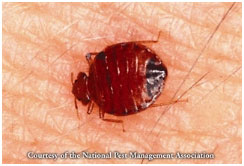Bed bugs are making an unwelcome comeback.
According to National Pest Management Association, there has been a resurgence of bed bugs (Cimex Lectularius) in the United States over the last two years. The Environmental Protection Agency held a  Bed Bug Summit in April of 2009 in response to both public and industry concerns about the increase in bed bug infestations. And reports about bed bugs have been aired in every major news outlet and in newspapers across the country.
Bed Bug Summit in April of 2009 in response to both public and industry concerns about the increase in bed bug infestations. And reports about bed bugs have been aired in every major news outlet and in newspapers across the country.
Bed bugs are back.
Bed bugs are small, wingless insects that feed on blood from animals or people. Bed bugs get their name because they like to hide in bedding and mattresses, but bed bugs can live on luggage, clothing, carpets and just about any place where humans are regularly present. They are nocturnal and very hardy with the ability to live for months without a meal. They travel well, actively hitch hiking on clothes, luggage and furniture until they find a new source of food.
How can you spot bed bugs?
Bed bugs are small black or reddish insects, about a ¼ inch long, with a broad oval shape and small head. Before feeding, they are flat. After a meal of human or animal blood, they become swollen and elongated.
Most people become aware of bed bugs after they are bitten and the bite marks appear on their skin. Some people notice small blood stains on their bedding from where the bed bug bit them. They will typically feed on people’s arms or shoulders, though any area of exposed skin can be a target. Bed bugs also can be detected by looking for their droppings – small, dark flecks left on sheets, floors, walls, furniture or clothes as the bed bugs are crawling to hiding spots.
They are often incorrectly associated with unclean conditions, but the truth is bed bugs can be found anywhere they find a reliable population of hosts (human or animal) and some cover to hide in while they are digesting or waiting for a host.
WHAT TO DO IF YOU THINK YOU HAVE BED BUGS
If you spot bed bugs or start noticing insect bites on your skin (often several bites in a straight line), call a pest control professional immediately. These are difficult insects to eradicate and most do-it-yourself measures will fall short of eliminating or controlling a population once they become established. Pest control companies will work to create an eradication plan that is right for your dwelling and your family.
How can I prevent bed bugs?
No measure is foolproof, but take the following steps to reduce your chances of becoming a bed bug target.
- When staying at a hotel use the luggage rack provided for your suitcase, and when possible, avoid placing your clothing in drawers.
- Check your luggage for visible signs of these pests upon returning from any trip. Bed bugs will attach themselves to luggage in hotels and office buildings and can travel for days to get to a safe location where they can feed on hosts. Shake out and thoroughly vacuum any bags or pocketbooks outside your home upon returning from any trips.
- If you think your bedding or clothing has been infested, wash all of it immediately (and any other fabrics those articles might have come in contact with) in hot water and dry them on the highest heat setting possible.
- Thoroughly and frequently vacuum your carpets, furniture (made of any material), your bed and bedding (especially the seams of your mattress), behind picture frames, along baseboards, and any other nook or cranny where a small insect can hide. Empty the vacuum cleaner bag thoroughly EACH TIME YOU VACUUM into a plastic trash bag outside your home. Tie the trash bag up extremely well and secure it in a covered trash can outdoors.
- Call a pest control professional immediately. Only they can accurately detect the extent of a bed bug infestation and can safely apply the pesticides needed to get rid of these stubborn insects.
What should I not do?
- Don’t attempt to use a “bug bomb” (long release aerosol pesticides) yourself to eradicate bed bugs. Consumers may put themselves in danger if they overuse pesticides in the home. These creatures are quite elusive and will require professional attention.
- Don’t hire anyone promising a miracle fix for bed bugs or anyone claiming they have access to special chemicals to treat bed bugs. Some unscrupulous individuals are preying on people’s strong distaste with the idea of bed bugs to make a quick buck with unproven treatment strategies or by using pesticides that are not approved or may be dangerous when used indoors.
What is the danger, if any?
Bed bugs and their feeding habitats have not been linked to nor have they been reported to cause any direct health problems for humans. But their droppings can trigger asthma attacks in susceptible individuals. Their bites are also quite itchy so treat that symptom, especially with children, so bite marks don’t become infected from excess scratching. Bedbug bites can be painful especially if you suffer multiple bites as is common with an infestation. There can also be a strong unpleasant smell associated with bed bugs. The noxious odor comes from either high quantities of their fecal matter or from active scent glands present on some bed bug species.